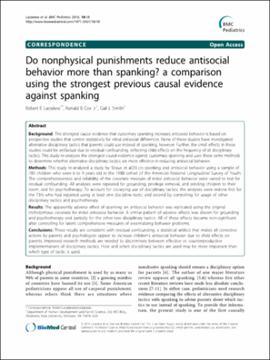| dc.contributor.author | Larzelere, Robert E. | |
| dc.contributor.author | Cox, Ronald Blake, Jr. | |
| dc.contributor.author | Smith, Gail L. | |
| dc.date.accessioned | 2019-08-21T22:01:23Z | |
| dc.date.available | 2019-08-21T22:01:23Z | |
| dc.date.issued | 2010-02-22 | |
| dc.identifier | oksd_larzelere_dononphysicalpu_2010-02-22 | |
| dc.identifier.citation | Larzelere, R. E., Cox, R. B., Jr., & Smith, G. L. (2010). Do nonphysical punishments reduce antisocial behavior more than spanking? A comparison using the strongest previous causal evidence against spanking. BMC Pediatrics, 10(1). https://doi.org/10.1186/1471-2431-10-10 | |
| dc.identifier.uri | https://hdl.handle.net/11244/321186 | |
| dc.description.abstract | Background: The strongest causal evidence that customary spanking increases antisocial behavior is based on prospective studies that control statistically for initial antisocial differences. None of those studies have investigated alternative disciplinary tactics that parents could use instead of spanking, however. Further, the small effects in those studies could be artifactual due to residual confounding, reflecting child effects on the frequency of all disciplinary tactics. This study re-analyzes the strongest causal evidence against customary spanking and uses these same methods to determine whether alternative disciplinary tactics are more effective in reducing antisocial behavior. | |
| dc.description.abstract | Methods: This study re-analyzed a study by Straus et al.[1] on spanking and antisocial behavior using a sample of 785 children who were 6 to 9 years old in the 1988 cohort of the American National Longitudinal Survey of Youth. The comprehensiveness and reliability of the covariate measure of initial antisocial behavior were varied to test for residual confounding. All analyses were repeated for grounding, privilege removal, and sending children to their room, and for psychotherapy. To account for covarying use of disciplinary tactics, the analyses were redone first for the 73% who had reported using at least one discipline tactic and second by controlling for usage of other disciplinary tactics and psychotherapy. | |
| dc.description.abstract | Results: The apparently adverse effect of spanking on antisocial behavior was replicated using the original trichotomous covariate for initial antisocial behavior. A similar pattern of adverse effects was shown for grounding and psychotherapy and partially for the other two disciplinary tactics. All of these effects became non-significant after controlling for latent comprehensive measures of externalizing behavior problems. | |
| dc.description.abstract | Conclusions: These results are consistent with residual confounding, a statistical artifact that makes all corrective actions by parents and psychologists appear to increase children's antisocial behavior due to child effects on parents. Improved research methods are needed to discriminate between effective vs. counterproductive implementations of disciplinary tactics. How and when disciplinary tactics are used may be more important than which type of tactic is used. | |
| dc.format | application/pdf | |
| dc.language | en_US | |
| dc.publisher | BioMed Central | |
| dc.rights | This material has been previously published. In the Oklahoma State University Library's institutional repository this version is made available through the open access principles and the terms of agreement/consent between the author(s) and the publisher. The permission policy on the use, reproduction or distribution of the material falls under fair use for educational, scholarship, and research purposes. Contact Digital Resources and Discovery Services at lib-dls@okstate.edu or 405-744-9161 for further information. | |
| dc.title | Do nonphysical punishments reduce antisocial behavior more than spanking? A comparison using the strongest previous causal evidence against spanking | |
| osu.filename | oksd_larzelere_dononphysicalpu_2010-02-22.pdf | |
| dc.description.peerreview | Peer reviewed | |
| dc.identifier.doi | 10.1186/1471-2431-10-10 | |
| dc.description.department | Human Development and Family Sciences | |
| dc.type.genre | Article | |
| dc.type.material | Text | |
| dc.subject.keywords | adolescent | |
| dc.subject.keywords | behavior control | |
| dc.subject.keywords | child | |
| dc.subject.keywords | child behavior | |
| dc.subject.keywords | child rearing | |
| dc.subject.keywords | cohort studies | |
| dc.subject.keywords | ethnic groups | |
| dc.subject.keywords | female | |
| dc.subject.keywords | humans | |
| dc.subject.keywords | male | |
| dc.subject.keywords | maternal behavior | |
| dc.subject.keywords | parent-child relations | |
| dc.subject.keywords | psychotherapy | |
| dc.subject.keywords | punishment | |
| dc.subject.keywords | socioeconomic factors | |
| dc.subject.keywords | young adult | |
